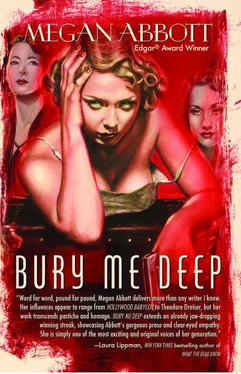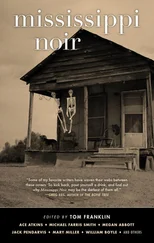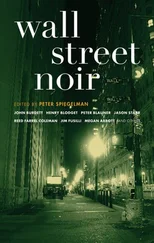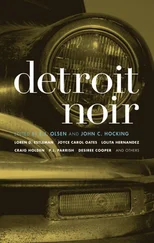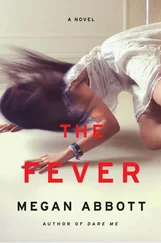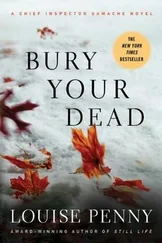MR. LANIGAN, Gent Joe, took her to lunch twice more that week. They spoke again, and at length, of his poor wife, buffered in cotton balls, glossed with ointments, wrapped tight like a swaddled baby, eyes glazed over with narcotics. And then, as they shook their napkins of crumbs and settled into tea at the end of the third lunch, he looked across the table and said, “And, Mrs. Seeley, how is your Dr. Seeley? How does he come to be so far from your side?”
Marion had been lifting her teacup and as the words struck her ear, for they did strike and with some force, the handle slid round her finger and slid from the crook her fingers made and cracked in two perfect pieces on the table. A chip flew in Marion’s eye and her lashes rustled against and a spot of blood flecked up and starred her brow.
It was all so terrible, with the crash and clatter and Joe Lanigan rushing round to assist her and the waitress walking her, more than half blind, to the ladies’ parlor to flood her eye under the sink, head cracking the sink twice, water running everywhere, even down her uniform, sopping her chest and trickling deep between her breasts and rivuleting down to her belly.
(For hours afterward, with each blink she’d think the porcelain pock was still there, still there and scraping, ridging her eye with each flutter.)
Riding from the tearoom in his motorcar, her hair slipping from beneath her scarf, she told him she couldn’t, no, couldn’t come to lunch again on Monday. And, far more, she would not be able to take up his recent invitation to attend, as his new friend, the birthday revels of one Ephraim Solway, a fellow Knight, in the banquet room of the El Royale Hotel.
She could not fathom what had come over her that had let it go and go and go. Sitting in restaurants together, legs sweeping against legs, hand on her back, the center of it, fingertips there, as she seated herself. It was dreadful. It was unforgivable at the core. In her head, she began formulating a letter to Dr. Seeley. (How was it now she could only think of him as “Dr. Seeley”? The longer he was away, the more impossible to name that looming absence “Everett,” much less some coo-cooing term, as she might let slip from her lips in their sweetest times, their private afternoons, he pressing his face gentle into her hair and calling her his darling, his dimple-cheeked dearest. When were those times?)
Yes, she told herself, she would write Dr. Seeley directly, chronicle the whole series of luncheons, and make him understand she’d stumbled—foolishly, yes, but she was young and all by herself and in a strange place for so long—into something improper and found her way out quickly, before a single observer could disapprove.
Oh, Dr. Seeley, you alone in fierce surroundings, tending nobly to the ruined lungs of sad-eyed Cornish miners, their own days trapped under bauxite, silver, manganese miles thick, nights spent brining their grief in sugarcane liquor. Oh, Dr. Seeley, your sacrifices so great and your soul beating off the dark furies inside you, that depthless, dooming taste for the needle and its bloom? Your sufferings so immense, and here I sit in comparative comfort and ease, defaming our marriage by degrees.
By the time Joe Lanigan had driven her, hand to wounded eye, back to the clinic, it was all she could do to fight off a heavy sob in her chest. As if he knew it, Mr. Lanigan was more the gentleman than ever, treating her with the delicacy and gentility he might his starch-gloved grandmother.
But when he’d delivered her to the front door, he touched her arm lightly, which he ought not to have, fingers sliding down her arm to her hand. And he turned her toward him and spoke quietly, solemnly, far too close to her twitching face, tears gluing on her lashes still. And he said this, and it was like a claw hammer to her heart:
“For all the world, Mrs. Seeley, I’d not leave your side. Were you my wife, for all the world, I’d not lose my way from you. I’d not abandon you to the world. Not in such hard times, not in any time. I’d not leave you out there in the dark middle, not you with that angel’s face, that beating chest, the pulse in your wrist I can feel even now. I’d not leave your side, Mrs. Seeley. I’d like to meet the man who could.”
That night, under covers and eyes still twitching, flickering back into her head, she dared think of a world where she, barely out from behind her father’s coats, would have fumbled her way to the likes of Joe Lanigan rather than her husband, brushing middle age even at thirty-five. Dr. Everett Seeley, with each passing year more like some gaunt returning soldier from far-off battles, those once-gallant features half ruined, those dark-ringed eyes and blue-edged cheekbones and the slow shuffle and the smell of his shirts on the ironing board. Dr. Seeley, so noble, so kind, but slipping from her with every passing second since they met. All he was was what was almost gone. The only thing that truly remained was the very thing that stripped their pockets clean twice a year since they’d married and finally sent him miles away, leaving her here, lovelier than ever and ripe for picking.
Oh, Joe Lanigan, you’ve found yourself a fellow sinner—how did you know it? Was it on my face like a witch’s mark? Or was it something vibrating in my eyes, something that said I am yours, I am yours.
MARION WAITED .She waited and Joe Lanigan did not call again the next day, nor the following. And the weekend came, and there was Saturday, the day of the planned birthday gala for Mr. Ephraim Solway at the El Royale Hotel, to which he had invited her and she had firmly, frantically declined.
At noon, collar itching and feeling squirmy and hot, she walked to the Pay’n Takit to buy laundry starch. On the way out, head heavy with thoughts, the bent ceiling fan stirring dust and rustling moth flies, she saw a wire canister by the register filled with chocolate nougatines wrapped in sticking waxed paper. Her hand clasped over one like a crow’s claw, she walked out of the store and onto the street, tearing off the wrapper and tucking it into her mouth and letting it sit there, strips of the wax still sticking to it, powdering her tongue, taking just enough of the pleasure away to send her back to the store, mouth clotted, to buy a second and pay for both, even as it would mean, for her at least, for the way she judged herself, no new shampoo for the week and she’d have a bologna sandwich for supper.
At one o’clock, she carried her laundry basket across the street to the Maddens, who let Mrs. Gower’s boarders use their electric washing machine if they brought their own soap flakes and put change in the kitty. Marion had grown up washing with a board and wringer, big kettle and bluing—it took a day or more. But then she was washing for the whole family and now she was just washing her own two work dresses, her nightgown, her underthings, her sheets and bath towel, which Mrs. Gower was supposed to launder but did not.
The hours stretched, arched, curled back, and Marion stood in the Gowers’ backyard where her dresses hung, paper dolls fluttering, and she stood and didn’t move and her head was filled with sorrow and it wasn’t the right kind of sorrow. She stood, the air barely moving, the sky muddy with late-afternoon muddiness, that dread feeling of stillness, which suggests no movement again, ever.
At seven o’clock, the appointed hour, Marion on the edge of her bed thinking, This would have been the time, were I to have been so wayward, or less wayward (for doing without knowing why, that must be happiness).
Somehow, still, she was awaiting his knock, could picture the door opening, his camel’s-hair-coat, hair-oil-glistening arrival, he like a man from a motion picture, on Kay Francis’s arm, towering over with broad shoulders and her hand slipping eagerly through the crook of his solid arm, he with a smile like Fredric March, like Robert Montgomery, like any of them. He was like any of them. All of them. Bright and shiny like polished dress shoes.
Читать дальше
